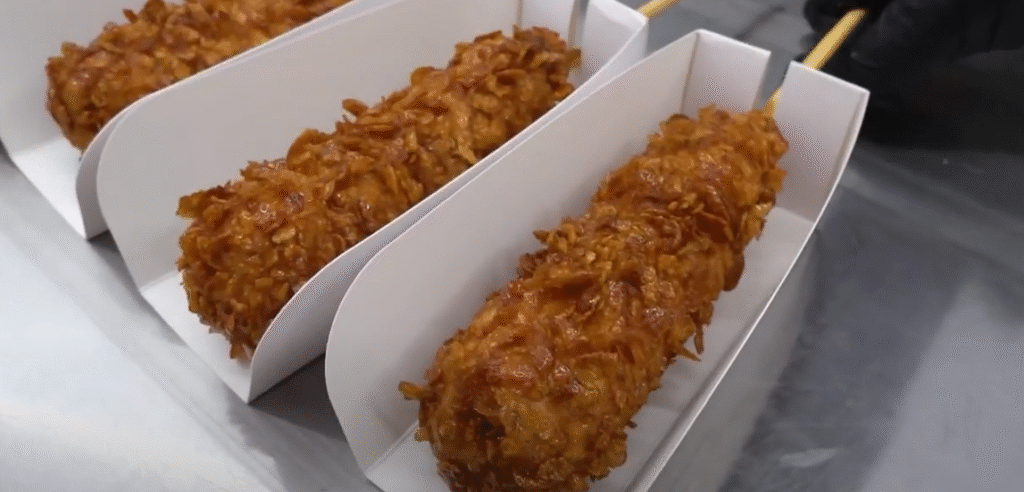Not only is the recall of almost 60 million pounds of sausage-on-a-stick and corn dog products a standard safety alert, but it also serves as a disturbing reminder of how easily consumer confidence can be undermined when oversight and scale collide. Following confirmed injuries caused by wooden fragments discovered embedded in batter, Tyson Foods’ Hillshire Brands Company voluntarily recalled State Fair and Jimmy Dean products. A single production error caused a nation’s homes, cafeterias, and institutions to collapse, a recall so massive it resembles a domino effect.
Although the recall was justified as being “out of an abundance of caution,” it actually reflects something much more serious: the rising risks associated with large-scale batch food production. When demand spikes, no business wants to slow down, conduct extensive testing, or stop production, as food safety expert Darin Detwiler noted. Rather, efficiencies rule, but they also bring vulnerability. A defect that used to only exist in a small town bakery can now spread across states, into the freezers of gullible families, and onto school lunchroom plates.
For many, the psychological pain is just as acute as the danger to their health. Not just a snack, corn dogs evoke memories of summer carnivals, Friday night ball games, and county fairs. Finding such a well-known food connected to contamination is extremely upsetting, especially for parents who consider them to be quick and effective dinner options. According to a mother who was interviewed by a local newspaper, her child almost bit into a corn dog that was covered in sharp pieces, and the incident “shattered my sense of safety in the simplest things.” A common fear was echoed by her voice: if a corn dog can’t be trusted, what can?
Corn Dog Recall – Case Overview
| Category | Details |
|---|---|
| Company | Hillshire Brands Company (subsidiary of Tyson Foods) |
| Product | State Fair Corn Dogs, Jimmy Dean Sausage-on-a-Stick & Breakfast-on-a-Stick items |
| Volume Recalled | About 58 million pounds of products |
| Reason | Possible contamination with wood pieces inside batter |
| Production Dates | March 17, 2025 – September 26, 2025 |
| Reported Injuries | At least 5 consumer injuries confirmed |
| Distribution | Sold nationwide in U.S. retail stores, schools, Defense Department facilities |
| Recall Class | USDA Class I (high risk to health) |
| Reference | USDA Food Safety and Inspection Service: Corn Dog Recall Notice |

USDA has confirmed that at least five of the injuries are personal, serving as a reminder that food safety is not a theoretical concept. Glass fragments in baby food jars and metal shards in frozen vegetables are just two examples of foreign objects in packaged goods that have previously caused recalls. The idea of wood splinters hiding inside something as commonplace as a corn dog, however, strikes a different chord and suggests the unseen flaws in industrial food pipelines.
Naturally, Hillshire Brands and Tyson maintain that the problem is small. Statements reassure customers that safety precautions will be significantly enhanced in the future and stress voluntary compliance. Industry experts, however, highlight the enormous financial and reputational costs. The loss of trust, which is much more difficult to replace than product replacement or disposal, is what happens when 58 million pounds of product are pulled. In a field where flavor is just as important as image, the blow is just as devastating as any monetary loss.
It brings to mind the time Blue Bell Creameries spent years rebuilding following a listeria outbreak, or Chipotle’s foodborne illness crisis that almost ruined the chain’s success. Trust in food is just as important as the food itself, as both cases made abundantly evident. Rebuilding after it has been damaged takes time, more stringent oversight, and unrelenting transparency. That same uphill climb is now facing Tyson, especially as calls for accountability are amplified by consumer advocacy groups.
Beyond the kitchen, the recall has reverberated culturally. Conversations about processed foods are altered by a corporate blunder of this size, much like a Hollywood scandal can drastically alter careers. There are a lot of comparisons on social media, some humorous (painting Tyson’s gaffe with celebrity scandals), and some very critical (tying the recall to more general discussions about corporate responsibility). A corn dog thus becomes a representation of the conflict between speed, profit, and safety as well as of Americana.
Families have been advised to look for codes like “EST-582” or “P-894” on freezers in recent days, which indicate potentially hazardous goods. The advice is telling in and of itself because it places the onus of responsibility on customers, asking them to be vigilant about their safety. It had long been assumed, however, that corporations, with their vast resources, would provide protection against just such situations. The truth is that oversight can occasionally occur only after harm has been done, as the recall makes clear.
The broader social lesson might be that recalls are signs of an industrial system that is under stress rather than isolated incidents. As scale continues to advance, details are missed, security is loosened, and incidents eventually increase. A system intended for volume rather than vigilance is the subject of the recall, which goes beyond wooden fragments in batter. From this perspective, the recall reminds us that efficiency without concern is only half the success.

